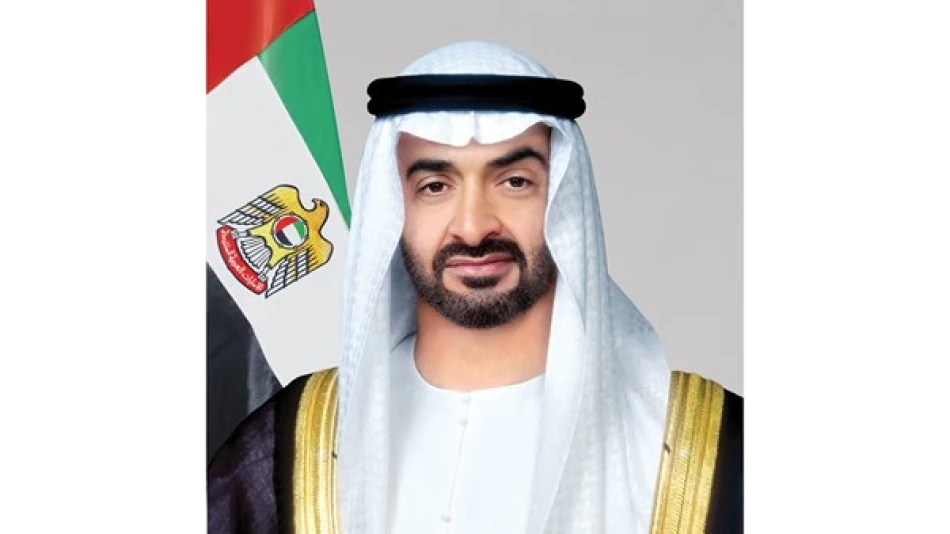
UAE President Visits Hungary for High-Level Diplomatic Talks
UAE President Arrives in Budapest for Strategic Diplomatic Mission to Hungary
UAE President Sheikh Mohammed bin Zayed Al Nahyan has arrived in Budapest for an official state visit to Hungary, accompanied by a high-level delegation that signals the Emirates' growing focus on Central European partnerships. The visit, marked by military aircraft escorts upon entering Hungarian airspace, represents a significant diplomatic push into a region where the UAE seeks to diversify its economic and political relationships beyond traditional Western allies.
High-Stakes Delegation Reflects Strategic Priorities
The composition of Sheikh Mohammed's entourage reveals the UAE's serious intentions for this Central European engagement. The delegation includes key figures across defense, investment, and advanced technology sectors, suggesting discussions will extend far beyond ceremonial diplomacy.
Economic Focus Takes Center Stage
The presence of Investment Minister Mohammed Hassan Al Suwaidi and Foreign Trade Minister Dr. Thani bin Ahmed Al Zeyoudi indicates potential major economic agreements on the horizon. Hungary's position as a manufacturing hub within the European Union makes it an attractive partner for UAE sovereign wealth funds and state-backed investment vehicles seeking European market access.
Mohamed Alabbar, chairman of Eagle Hills and a prominent figure in UAE's real estate and retail sectors, joins the delegation—a clear signal that infrastructure and development projects may feature prominently in bilateral discussions.
Technology and Defense Cooperation on the Agenda
Dr. Sultan bin Ahmed Al Jaber's participation as Minister of Industry and Advanced Technology, alongside strategic research advisor Faisal Abdul Aziz Al Bannai, suggests the UAE is positioning Hungary as a potential technology partnership hub. This aligns with the Emirates' broader strategy to reduce oil dependency through technological innovation and diversification.
Central Europe: UAE's New Diplomatic Frontier
This Budapest visit reflects a calculated shift in UAE foreign policy toward Central and Eastern Europe. Unlike Western European nations that have occasionally criticized UAE's human rights record, countries like Hungary offer more pragmatic, business-focused relationships without extensive political conditions.
Strategic Timing Amid Global Realignment
The visit comes as Hungary, under Viktor Orbán's leadership, has increasingly pursued independent foreign policy paths within the EU framework. This creates opportunities for the UAE to establish partnerships with a European nation less constrained by traditional Western diplomatic consensus.
For Hungary, deeper UAE ties offer access to Gulf capital and potential energy security diversification—particularly valuable as Europe continues managing energy supply challenges following geopolitical tensions with Russia.
Investment Implications and Market Opportunities
The UAE's approach to Hungary mirrors successful strategies employed in other European markets. The Emirates has demonstrated particular success in infrastructure investments, sovereign wealth fund acquisitions, and creating logistics hubs that serve broader regional markets.
Hungary's automotive manufacturing sector, growing technology industry, and strategic location between Western Europe and emerging Eastern markets present clear opportunities for UAE capital deployment. The country's relatively stable political environment and EU membership provide institutional frameworks that Gulf investors typically favor.
Broader Regional Strategy
This diplomatic initiative positions the UAE to potentially replicate its successful economic partnerships established with countries like Singapore and various African nations. By engaging Central European markets, the Emirates continues its strategy of creating diverse global partnerships that reduce dependence on any single economic or political bloc.
The military escort and ceremonial aspects of the visit underscore Hungary's recognition of the UAE as a significant global player whose partnerships extend well beyond regional Middle Eastern influence.
Most Viewed News

 Layla Al Mansoori
Layla Al Mansoori






